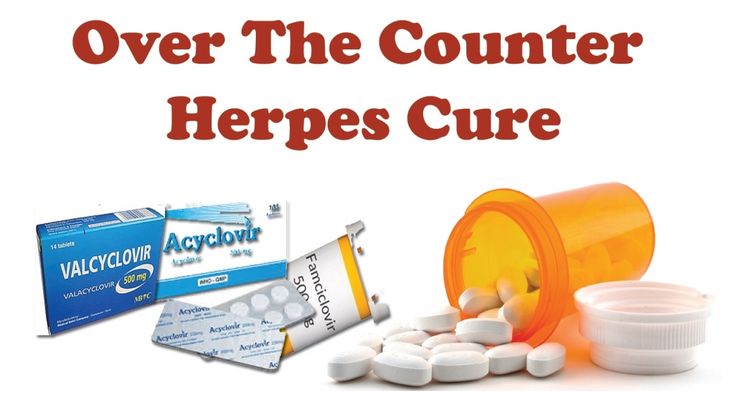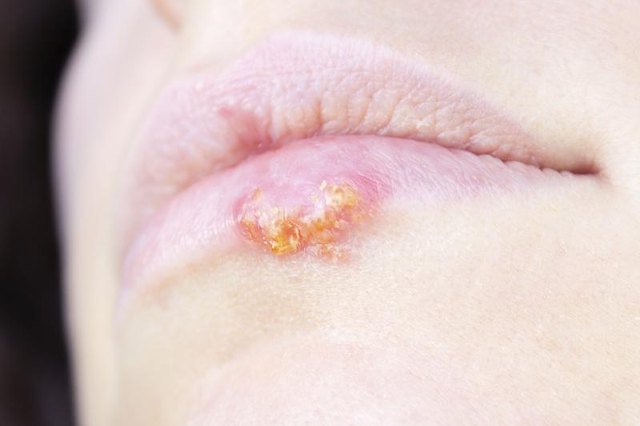Taking A Genital Or Oral Herpes Test
Testing for genital and oral herpes may be performed with a blood sample or a sample of fluid swabbed or scraped from a sore. Both types of samples are collected by a health professional when conducted at a doctors offices, clinic, or community organization.
If a patient is experiencing an outbreak, a doctor can collect a sample for testing by swabbing or scraping a sore. Material from the sore can be used for a herpes viral culture, PCR testing,
A Tzanck smear or an antibody test.
If a patient is not currently experiencing an outbreak, a blood test may be used to identify HSV antibodies. If a doctor suspects a brain infection with HSV, a lumbar puncture may be performed to obtain a sample of cerebrospinal fluid for analysis.
Treatment If The Blisters Come Back
Go to a GP or sexual health clinic if you have been diagnosed with genital herpes and need treatment for an outbreak.
Antiviral medicine may help shorten an outbreak by 1 or 2 days if you start taking it as soon as symptoms appear.
But outbreaks usually settle by themselves, so you may not need treatment.
Recurrent outbreaks are usually milder than the first episode of genital herpes.
Over time, outbreaks tend to happen less often and be less severe. Some people never have outbreaks.
Some people who have more than 6 outbreaks in a year may benefit from taking antiviral medicine for 6 to 12 months.
If you still have outbreaks of genital herpes during this time, you may be referred to a specialist.
You May Like: How Long Does An Untreated Herpes Outbreak Last
Whats Involved In Herpes Testing
If there are blisters or sores, a healthcare provider may gently swab the area to take a fluid sample and test it. If there are no sores, but you are concerned you may have been exposed, a blood test may done. Herpes tests are not normally recommended unless you have symptoms.
Recommended Reading: How To Speed Up Herpes Outbreak Healing
You May Like: What Are The Symptoms Of Oral Herpes
If You Have Genital Herpes Already Can It Be Spread To Other Parts Of The Body Such As The Arms Or Legs
No. Genital herpes cannot be transmitted to another part of your body such as your arm, leg or hand after the first infection occurs. If you have genital HSV II, you will not get HSV II at another site in your body. The immune system produces antibodies that protect other parts of your body from infection. However, there are cases where a person has multiple site infections from the same virus. This is usually acquired at the time of the first infection. For example, if someone has never had herpes but then has oral and genital sex with an infected partner, they can acquire the infection at both sites.
Can I Get Genital Herpes More Than Once

There isnt a cure for HSV-2, the virus that causes genital herpes. Infections can come back . Recurring symptoms are usually milder than the first outbreak. Symptoms dont last as long with later outbreaks. Some people may only have one or two outbreaks during their lifetime. Others may have as many as four or five outbreaks a year.
After infection, the virus moves from skin cells to nerve cells. In the nerve cells, it becomes inactive . Certain things may reactivate the virus, such as:
- Illness or fever.
Read Also: Can You Catch Herpes From Kissing
Herpes Pregnancy And Newborn Infants
Herpes can pose serious risks for a pregnant woman and her baby. The risk is greatest for mothers with a first-time infection because the virus can be transmitted to the infant during childbirth. Guidelines from the American Academy of Pediatrics recommend using specific diagnostic tests for women in labor to determine the risk of transmission. Babies born to mothers infected with genital herpes are often treated with the antiviral drug acyclovir, which can help suppress the virus.
How To Heal A Herpes Outbreak Quickly
This article was medically reviewed by Lacy Windham, MD. Dr. Windham is a board certified Obstetrician & Gynecologist in Tennessee. She attended medical school at the University of Tennessee Health Science Center in Memphis and completed her residency at the Eastern Virginia Medical School in 2010, where she was awarded the Most Outstanding Resident in Maternal Fetal Medicine, Most Outstanding Resident in Oncology, and Most Outstanding Resident Overall.There are 8 references cited in this article, which can be found at the bottom of the page.wikiHow marks an article as reader-approved once it receives enough positive feedback. In this case, 93% of readers who voted found the article helpful, earning it our reader-approved status. This article has been viewed 108,707 times.
Herpes is caused by a virus called herpes simplex. Once the virus enters ones body, it will always remain there by hiding in the nerve roots. When ones immunity is lowered, it will result in outbreak. Sores usually take about 1-2 weeks to heal, but there are some things that you can do to speed the healing process. Things like allowing your sores to be exposed to air, talking to your doctor about medications, and using ointments may help speed healing time. There are also some things that you can do to reduce and prevent outbreaks, such as reducing prolonged exposure to sunlight, reducing friction during sex, and managing stress.
You May Like: Can You Tell How Long You Ve Had Herpes
You May Like: How To Heal Herpes Fast
Valacyclovir For Recurrent Herpes Outbreaks
Herpes can remain dormant in the body for weeks, months or years in between outbreaks. On average, people with HSV-1 experience about one outbreak per year, while people with HSV-2 will usually experience four to five outbreaks per year.
When these outbreaks occur, valacyclovir can provide fast and effective relief, helping to control herpes outbreak symptoms.
The typical valacyclovir dosage for recurrent herpes outbreaks is 500 mg two times per day over a period of three days. Like with first-time herpes outbreaks, valacyclovir is most effective when its taken as soon as you notice a herpes outbreak developing.
When taken as soon as you notice a herpes outbreak, valacyclovir can provide relief in as little as two to three days, minimizing symptoms and reducing the risk of you passing genital herpes to sexual partners.
> > MORE:HSV 1 vs. HSV 2 Whats the difference?
Approaches By Virus Life Cycle Stage
Viruses consist of a genome and sometimes a few enzymes stored in a capsule made of protein , and sometimes covered with a lipid layer . Viruses cannot reproduce on their own and instead propagate by subjugating a host cell to produce copies of themselves, thus producing the next generation.
Researchers working on such rational drug design strategies for developing antivirals have tried to attack viruses at every stage of their life cycles. Some species of mushrooms have been found to contain multiple antiviral chemicals with similar synergistic effects.Compounds isolated from fruiting bodies and filtrates of various mushrooms have broad-spectrum antiviral activities, but successful production and availability of such compounds as frontline antiviral is a long way away. Viral life cycles vary in their precise details depending on the type of virus, but they all share a general pattern:
Before cell entry
This stage of viral replication can be inhibited in two ways:
Uncoating inhibitor
Read Also: How To Heal Herpes Fast
Also Check: How Can You Avoid Herpes
How Often Do Outbreaks Occur
The number of outbreaks someone has varies from person to person. The average number of outbreaks for a person with genital HSV-2 is four to five per year. The average for genital HSV-1 is less than one outbreak per year.
Usually, there are more outbreaks during the first year, and many people find that outbreaks become less severe and less frequent with time.
Herpes triggers are highly individual, but with time, many people learn to recognize, and sometimes avoid, factors that seem to reactivate HSV in their own bodies. Illness, poor diet, emotional or physical stress, friction in the genital area, prolonged exposure to ultraviolet light , surgical trauma, and steroidal medication may trigger a herpes outbreak.
The frequency of outbreaks can often be managed through effective stress management, and getting adequate rest, nutrition, and exercise. For people with frequent outbreaks, suppressive therapy with any one of the antiviral treatments can reduce outbreaks by as much as 80%.
Facts And Statistics About Herpes
- According to the World Health Organization, an estimated two-thirds of the global population under 50 years old are infected with herpes simplex virus type 1 .
- Estimates for HSV-1 prevalence in the U.S. among people aged 049 years are 178 million women and 142 million men .
- In total, about 75 percent or more of the American adult population has the HSV-1 virus that usually causes oral herpes , and about 20 percent to 30 percent have HSV-2 that usually causes genital herpes.
- Men and women are affected by HSV-1 about equally. Roughly 6 million women in the U.S. become infected with HSV-1 each year, along with 5 million men.
- Slightly more women than men are affected by genital herpes, whether from HSV-1 or HSV-2. Middle-aged women are most likely to acquire genital herpes.
- Transmission of HSV most often occurs without symptoms, so its estimated that 85 percent of people with genital herpes dont know it. Many dont have any symptoms at all after the initial infection, and only about 15 percent ever receive a HSV-2 infection diagnosis in their lifetimes.
- Most primary oral/facial HSV infections are caused by HSV-1 however, facial infection by HSV-2 is increasingly becoming common.
- Less children are becoming infected with HSV-1 than in the past in high-income countries, mostly due to better hygiene and living conditions.
- After someone comes into contact with an active herpes outbreak on another person, the incubation period takes about one week.
Recommended Reading: Can You Pass Herpes Without An Outbreak
How Is Herpes Simplex Treated
Some people have few to no herpes outbreaks and choose not to have treatment. But many people prefer to use medications that shorten outbreaks and reduce symptoms.
During an outbreak, you may use an antiviral ointment or cream to help lessen your symptoms and help them go away faster, but it only works if you start it soon after you start an outbreak. Many people with HSV-2 take daily oral medications to keep outbreaks at bay.
Your provider may prescribe a topical medication or oral medication such as:
Initial Outbreak Of Genital Herpes

A person’s first outbreak of HSV-2 tends to last longer than subsequent outbreaks. Some people develop an outbreak quickly after contracting the herpes virus, while others don’t have symptoms that appear for several months or even years. Some lucky people never develop symptoms at all.
The initial episode of genital herpes also tends to be more painful than future outbreaks. Many people develop flu-like symptoms during their initial outbreak. These can include headache, fever, body aches, swollen lymph nodes and tiredness.
The first outbreak of HSV-2 can last between two and four weeks.
Also Check: How To Deal With Having Genital Herpes
Why Genital Herpes Comes Back
Genital herpes is caused by a virus called herpes simplex. Once you have the virus, it stays in your body.
It will not spread in your body to cause blisters elsewhere. It stays in a nearby nerve and causes blisters in the same area.
If you can, avoid things that trigger your symptoms.
Triggers can include:
- surgery on your genital area
- a weakened immune system for example, from having chemotherapy for cancer
What Are The Signs Of Herpes In Children
The herpes virus can be spread to babies and children if they are kissed by someone that is infected and has active cold sores. Although rare, it is also possible to spread herpes to a child or infant by touch if a person touches their cold sore and then touches the baby or child.
Precautions can be taken to protect infants and other children from getting the virus. Avoid kissing children if you have a cold sore and ask other people not to as well. Wash your hands frequently if you have a cold sore and you are around children.
Read Also: How To Tell My Boyfriend I Have Herpes
If The Top Layer Of The Cornea Is Affected
Treatment is with antiviral eye ointment or drops . These do not kill the virus but stop it from multiplying further until the infection clears. You should take the full course exactly as prescribed. This is often several times a day for up to two weeks. The aim is to prevent damage to the transparent front part of the eye .
How Long Do Herpes Symptoms Take To Show
On average, it takes about 4 days after exposure to start showing the symptoms of herpes. The herpes incubation period ranges between 2 and 12 days. The most common early sign of herpes is sores around the genitals or mouth.
The first time you get the herpes virus, it may cause flu-like symptoms, such as a fever, headache, and body aches. Then, subsequent outbreaks may cause sores and less severe symptoms. Generally, the frequency of outbreaks lessens over time.
You May Like: How To Take Off Herpes
Recognizing The Signs: The Prodrome
Early in the phase of reactivation , many people experience an itching, tingling, or painful feeling in the area where their recurrent lesions will develop. This sort of warning symptomcalled a prodromeoften comes a day or two before lesions appear. To be on the safe side, its best to assume virus is active during these times.
Can Herpes Outbreaks Be Prevented
Herpes outbreaks have a high risk of being spread through frequent sexual contact. These herpes outbreaks last longer if one continues to aggravate the condition. It is recommended that one abstain from sexual contact during an outbreak or if you suspect the onset of an outbreak.
The use of medication is the best way to lessen the effects of the virus once it has been contracted. Consult with your doctor about which medication will work best for you.
Through the help of herpes medication, the frequency of a herpes outbreak can be controlled as long as one is diligent in taking the medication and adheres to their prescribed treatment plan. The disease cannot be cured therefore the best treatment is always prevention. For those who have contracted the virus and must live with it, medication offers the best long term treatment.
Read Also: What Antiviral Medication Is Used For Herpes
Valtrex For Genital Herpes
Even if youre taking Valtrex, its still possible to have an outbreak. If youre taking Valtrex for recurrent genital herpes and have an outbreak, its important to avoid sexual contact with your partner to keep the virus from spreading to them. Even if youre not experiencing an outbreak, using condoms is a good idea to prevent transmission.
Also, if youre wondering if your uninfected partner can take Valtrex to avoid becoming affected, the answer is no. Someone without herpes simplex virus shouldnt take medication for something they dont have. This could cause serious side effects or health problems.
You May Like: How Long Will It Take For Herpes To Go Away
What Does The Test Result Mean

Direct detection of the virus
- A positive HSV DNA test or culture indicates that you have an active herpes infection, and the result may indicate if it is HSV-1 or HSV-2.
- A negative PCR test or culture indicates that the herpes simplex virus was not detected, but this does not definitely rule out an infection. False negatives can occur if there is not enough active virus in the sample. This may happen if the lesion is cultured more than 48 hours after the symptoms appear. If suspicion of herpes remains high, repeat testing may be done.
Antibody blood tests
- A positive HSV-1 or HSV-2 IgG antibody test means antibodies are present in your blood, which means you have had an infection in the past even if you haven’t noticed any symptoms. The type of antibody detected indicates the type of HSV infection.
- Negative HSV antibody results mean that it is unlikely that you have been exposed to HSV or it may mean that your body has not had time to begin producing HSV antibodies.
You May Like: How To Know If You Have Genital Herpes
Herpes On The Face Of Pregnant Women
Herpes on the mothers face also poses a danger to her newborn baby.
Newborns immune systems are weak and infection with the herpes simplex virus can cause death.
A mother with herpes on her face should take extreme measures to prevent her baby from getting it.
If herpes affects the mothers lips, she can use hydrocolloid patches to reduce the time of the outbreak and prevent the baby from coming into contact with the outbreak area and its secretions.
Women with newborn children who have had herpes outbreaks on their faces should avoid kissing their baby and for no reason kissing their baby on his or her face.
Recommended Reading: Is Herpes Curable With Antibiotics
Why Are There State
Syphilis, gonorrhea, and chlamydia are notifiable diseases in the United States, but herpes is not. A disease is notifiable if healthcare providers in all 50 states are required by law to report the diagnosis to their state or local health departments. CDC is also notified, and publishes state-by-state data for these infections. Because herpes infections are not notifiable infections by law, CDC is not able to provide state-by-state data. Public health surveillance for herpes infections is mainly done through population-based, national surveys, such as the National Health and Nutrition Examination Survey .
Read Also: How To Clean Herpes Outbreak